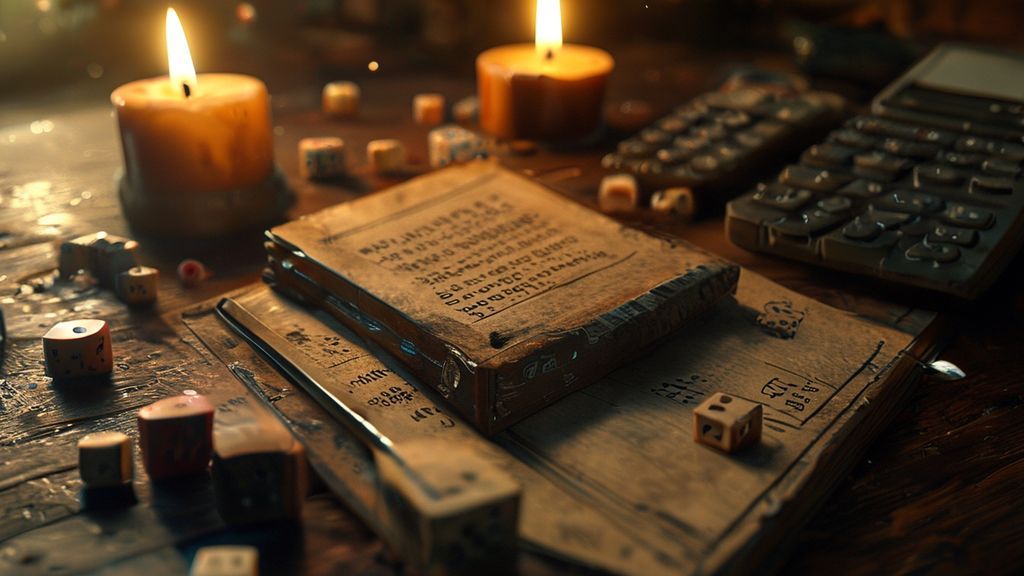D&D 5e Ability Score Calculator
Enter your 4d6 rolls (drop lowest) or point buy values to calculate modifiers.
dnd 5e calculator is an essential resource for players and Dungeon Masters seeking to quickly resolve complex game mechanics, from damage and healing to skill checks and spell effects.
What is dnd 5e calculator?
A dnd 5e calculator is a specialized tool designed to automate the mathematical elements of the Dungeons & Dragons Fifth Edition ruleset. Instead of manually adding dice rolls, modifiers, and bonuses, this calculator performs these computations instantly. It helps players track hit points, calculate spell save DCs, determine experience point thresholds, and resolve combat actions with accuracy, reducing errors and speeding up gameplay. These tools are invaluable for both in-person sessions and virtual tabletops, ensuring that the focus remains on storytelling and strategy rather than arithmetic.
- D&D 5e Ability Score Calculator
- Your Ability Modifiers
- What is dnd 5e calculator?
- How to Use dnd 5e calculator?
- What Is a D&D 5E Calculator?
- Core Types of Calculators for D&D 5E
- Essential D&D 5E Calculations Every Player Needs
- Damage and Attack Roll Calculators
- Using XP Thresholds and CR Calculators
- Spell Slot and Resource Management Tools
- Comparing Online vs. Offline D&D 5E Calculators
- Pros and Cons of Web-Based Apps
- Frequently Asked Questions
- What is the best D&D 5E calculator for new players?
- Can I use a D&D 5E calculator during a live session?
- How do I calculate XP and challenge rating (CR) for encounters?
- Are there D&D 5E calculators for spell effects and conditions?
- Do D&D 5E calculators work for homebrew content?
- What's the difference between a D&D 5E damage calculator and a full encounter builder?
- Can I build my own D&D 5E calculator spreadsheet?
- Are there official D&D 5E calculators from Wizards of the Coast?
How to Use dnd 5e calculator?

Using a dnd 5e calculator is typically straightforward. Follow these general steps to get started:
- Identify the Calculation Needed: Determine what you need to compute. Common categories include combat (attack rolls, damage, hit points), spellcasting (spell slots, save DCs), or character progression (leveling, experience).
- Input Relevant Values: Enter the necessary numbers from your character sheet or the game situation. This may include your ability scores (Strength, Dexterity, etc.), proficiency bonus, weapon damage dice, and any situational modifiers (like advantage/disadvantage or magical bonuses).
- Select Game Parameters: Choose the specific rule or scenario from dropdown menus or buttons. For example, select “Attack Roll” or “Healing Spell” to access the correct calculation fields.
- Review the Output: The tool will display the result, which may be a single number (like total damage) or a detailed breakdown showing the dice rolls, modifiers, and final total. Some calculators also provide the mathematical formula used.
- Apply the Result: Use the calculated value in your game. Update your character’s hit points, track spell slot usage, or inform the DM of the outcome.
For best results, always ensure the calculator’s ruleset is set to dnd 5e and that you are inputting values from the correct edition, as some mechanics differ between D&D versions.
What Is a D&D 5E Calculator?
A D&D 5E calculator is a specialized digital tool designed to automate the complex mathematics inherent in the fifth edition of Dungeons & Dragons. While the game’s rules are built on a simple d20 system, the cumulative calculations for damage, experience points, encounter difficulty, and spell slot management can become overwhelming, especially during tense sessions. These calculators serve as a digital dungeon master’s screen or a player’s character sheet, instantly processing variables like ability modifiers, proficiency bonuses, and situational bonuses to provide accurate results. By handling the arithmetic, they allow players and Dungeon Masters to focus on narrative, strategy, and roleplaying, transforming tedious number-crunching into seamless gameplay. Whether you’re a seasoned adventurer or a novice DM, a reliable calculator is an indispensable asset for maintaining game flow and accuracy.
Core Types of Calculators for D&D 5E
The ecosystem of D&D 5E calculators is diverse, catering to different aspects of the game and user needs. The most fundamental category is the damage and attack roll calculator, which is essential for every player. This type of tool takes inputs such as the weapon’s base damage dice (e.g., 1d8), the character’s relevant ability modifier (like Strength for a greatsword), and any applicable bonuses (like a +1 magic weapon or the Great Weapon Master feat) to output the total damage potential or the outcome of an attack roll. A second critical category is the encounter builder and difficulty calculator, which is primarily a Dungeon Master’s tool. This calculator uses the game’s Challenge Rating (CR) system, party size, and average party level to compute the total XP value of a group of monsters and determine if the encounter is Easy, Medium, Hard, or Deadly, helping to balance challenges appropriately.
Beyond these, there are calculators for more specific and advanced tasks. Spell slot and resource trackers are invaluable for spellcasters like wizards and clerics, allowing them to input their character level and spellcasting ability to see their daily allotment of slots per level, often with the ability to mark them off as they are used. Experience point (XP) calculators streamline the process of awarding XP after an encounter by allowing the DM to input the CR of defeated monsters and the number of party members, automatically distributing the correct share to each character. Furthermore, there are random encounter generators that, while not calculators in the purest sense, use mathematical algorithms to generate balanced encounters based on terrain, time of day, and party level. Finally, hit point (HP) and death save trackers are crucial for managing character health, tracking current HP, maximum HP, temporary HP, and the three failed or successful death saving throws a character makes when dying, ensuring no detail is missed in the chaos of combat.
Essential D&D 5E Calculations Every Player Needs
For any player, mastering a few key calculations is the first step toward efficient and effective gameplay. The most immediate and frequent calculation is determining the outcome of an attack roll. This involves rolling a d20 and adding the character’s proficiency bonus (if proficient with the weapon) and the relevant ability modifier (e.g., Dexterity for a finesse weapon). The result must equal or exceed the target’s Armor Class (AC) to hit. A related but separate calculation is damage, which occurs on a successful hit. This involves rolling the weapon’s damage dice (e.g., 2d6 for a greatsword) and adding the same ability modifier used for the attack (with exceptions for certain features like the Dueling fighting style). Understanding these two interconnected processes is fundamental to contributing in combat.
Another vital calculation for players, particularly those playing spellcasters, involves managing spell slots and saving throw DCs. A spell’s saving throw DC is calculated as 8 + your proficiency bonus + your spellcasting ability modifier. This number is what enemies must beat to resist your spells, making it a key metric to optimize. For spellcasters, tracking their daily spell slots is a logistical necessity; a calculator can show that a 5th-level wizard has four 1st-level slots, three 2nd-level, two 3rd-level, and one 4th-level, preventing confusion. For martial characters, calculating the potential damage output of specific combat maneuvers or features, such as a Battle Master’s superiority die or a Rogue’s Sneak Attack, is equally important. These calculations inform strategic decisions, like whether to use a limited resource for a potentially higher damage output or to save it for a critical moment.
Beyond combat, players often need to calculate skill checks and ability challenges. This typically involves rolling a d20 and adding the relevant ability modifier and proficiency bonus if the skill is proficient. However, many situations involve passive scores, such as a character’s passive Perception (10 + Wisdom modifier + proficiency if proficient). This static number is what a DM uses to determine if a character notices something without actively searching, making its calculation crucial for stealthy characters or observant DMs. Additionally, players might need to calculate carrying capacity (Strength score x 15 in pounds) or jumping distances (Strength score in feet for a running jump), which are simple but frequent calculations that affect exploration and inventory management. Having a quick reference for these ensures smooth gameplay during exploration and social interaction.
Damage and Attack Roll Calculators
Damage and attack roll calculators are the workhorses of D&D 5E digital tools, designed to eliminate the repetitive math of combat. At their core, these calculators require a few standard inputs: the base damage dice of the weapon or spell (e.g., 1d6, 2d8, 8d6), the ability modifier used for the attack (Strength, Dexterity, etc.), and any flat bonuses or penalties. More advanced versions allow for the input of situational modifiers, such as the +2 bonus from the Archery fighting style, the penalty from using a weapon with the Heavy property while not proficient, or the bonus from a magic weapon. The calculator then simulates the roll, often allowing the user to specify whether they want an average damage result or a simulated random roll. For attack rolls, it combines the d20 roll with the proficiency bonus and ability modifier to compare against a target AC, instantly determining hit or miss.
The true power of these calculators lies in their ability to handle complex character features and feats. For example, a character with the Great Weapon Master feat can choose to take a -5 penalty to their attack roll for a +10 bonus to damage if they hit. A robust calculator will allow the user to toggle this feature on or off, instantly recalculating both the probability to hit (which decreases) and the potential damage output (which increases). Similarly, for a spell like Fireball, a calculator can account for the 8d6 fire damage, the character’s spellcasting ability modifier for the attack roll (if it’s a spell attack), and any elemental affinity or metamagic options like Empowered Spell. This level of detail allows players to model different combat strategies, such as deciding whether to use a high-level spell slot for a massive damage spike or conserve it for a utility spell later in the day.
For Dungeon Masters, these calculators are invaluable for quickly determining the damage output of monsters. A DM can input a monster’s multiattack routine (e.g., two claw attacks at +6 to hit for 1d6+4 damage each and one bite attack at +6 for 1d10+4) to see its average damage per round (DPR). This DPR is a critical metric for balancing encounters, as it helps the DM understand how much damage the party will likely take in a given round. By comparing the monster’s DPR to the party’s total hit points and healing potential, the DM can adjust the encounter on the fly, perhaps by having monsters target different party members or by adjusting their tactics. This transforms the calculator from a simple player aid into a powerful encounter management tool, ensuring that battles are challenging but not unfairly lethal. The ability to quickly compute these values keeps the game moving and maintains the dramatic tension of combat.
Mastering the art of encounter design is one of the most challenging yet rewarding aspects of being a Dungeon Master in Dungeons & Dragons 5th Edition. While the Dungeon Master’s Guide provides foundational rules, moving beyond simple monster selection requires a deeper understanding of action economy, terrain, and party composition. This is where advanced encounter balancing tools become indispensable. These tools don’t just calculate a single number; they allow you to simulate complex combat scenarios, adjust for party strengths and weaknesses, and ensure that every battle feels both challenging and fair. By leveraging these calculators, you can transform a potentially tedious prep session into a creative process, allowing you to focus on narrative and tactical depth rather than getting bogged down in manual arithmetic.
For instance, consider a party of four 5th-level adventurers. A simple CR 5 monster might seem like an appropriate challenge based on the XP thresholds table. However, an advanced calculator can account for the party’s specific damage output, healing capabilities, and control spells. It might reveal that the monster’s legendary actions could overwhelm the party if it’s not paired with minions, or that the party’s high damage output could trivialize the encounter without environmental hazards. These tools often include sliders for variables like terrain difficulty, monster morale, and even player experience level, providing a dynamic model rather than a static calculation. This depth of analysis helps you craft memorable encounters that push your players to their limits without leading to a frustrating or anticlimactic outcome.
Using XP Thresholds and CR Calculators
The core of 5th Edition encounter balancing revolves around the XP Thresholds system outlined in the Dungeon Master’s Guide. This system categorizes encounters into four difficulty levels—Easy, Medium, Hard, and Deadly—based on the party’s level and the total XP value of the monsters involved. A standard CR calculator takes this a step further by automating the math. You input your party’s level and size, and the tool calculates the XP budget for each difficulty tier. You then select monsters, and the calculator sums their XP value, comparing it to the budget and flagging whether the encounter falls into a specific difficulty category. This is the baseline function of any good D&D 5E calculator.
However, the true utility of these tools emerges when you move beyond simple XP totals. Advanced calculators incorporate the concept of the “Encounter Multiplier,” which adjusts the XP value based on the number of monsters. This multiplier is crucial because a single monster is often less dangerous than multiple weaker monsters, even with the same total XP, due to action economy. A sophisticated calculator will automatically apply these multipliers and may also allow you to adjust for monster special abilities, such as auras or legendary resistances, which can significantly impact the encounter’s difficulty. For example, a creature with a paralyzing gaze or a powerful area-of-effect spell might be worth more than its XP suggests. By using these tools, you can fine-tune encounters to be precisely challenging, ensuring that your players feel a genuine sense of accomplishment after a hard-fought victory.
| Difficulty | XP Threshold (1st Level, 4 players) | XP Threshold (5th Level, 4 players) | XP Threshold (10th Level, 4 players) |
|---|---|---|---|
| Easy | 100 XP | 1,100 XP | 3,900 XP |
| Medium | 200 XP | 2,200 XP | |
| Hard | 300 XP | 3,300 XP | |
| Deadly | 400 XP | 4,400 XP |
Furthermore, many calculators now integrate directly with monster databases like D&D Beyond or Open5e, allowing you to pull monster stat blocks directly into your encounter. This integration streamlines the process and reduces the chance of manual data entry errors. Some tools even offer “encounter builder” features, where you can drag and drop multiple monsters, adjust their HP or AC on the fly, and see the encounter difficulty update in real-time. This is particularly useful for creating complex battles with varied enemy types, such as a mix of melee brutes, ranged attackers, and spellcasters. By using these features, you can ensure that each enemy has a distinct role in the fight, making the encounter more dynamic and engaging for your players.
Spell Slot and Resource Management Tools
Resource management is a critical pillar of D&D 5th Edition gameplay, and spell slots are often the most valuable resource for spellcasters. Running out of spell slots can leave a wizard or cleric feeling powerless, especially in a long adventuring day. Spell slot and resource management tools are designed to help both players and Dungeon Masters track these finite resources, plan for future encounters, and understand the long-term implications of spell usage. For players, these tools can serve as digital spellbooks and slot trackers, automating the tedious bookkeeping and allowing them to focus on tactical decisions. For Dungeon Masters, they are invaluable for designing adventuring days that properly tax the party’s resources, creating a sense of tension and scarcity that drives the narrative forward.
Advanced resource management tools go beyond simple slot counters. They often include features for tracking hit dice, sorcery points, ki points, Channel Divinity uses, and even consumable items like potions and scrolls. Some tools allow you to set up an “adventuring day” template, where you can pre-plan the number and difficulty of encounters, and the tool will project the party’s resource expenditure over time. This is particularly useful for ensuring that a dungeon crawl feels like a genuine challenge, where players must carefully consider which spells to cast and when. For example, a tool might show that after three medium encounters, the party’s spellcasters will be down to their lower-level slots, making a subsequent boss fight significantly more dangerous. This insight allows you, as a DM, to adjust the pacing or introduce resource-restoring elements like a friendly NPC or a magical spring.
Furthermore, these tools can be integrated with character sheet applications, creating a seamless experience. When a player casts a spell, the tool can automatically deduct the appropriate slot, update their remaining HP and hit dice, and even log the spell for reference. This automation reduces administrative overhead and minimizes the risk of errors. For Dungeon Masters, there are tools that allow you to view the party’s current resource status, helping you to tailor your encounters on the fly. If you notice the party is low on resources, you might introduce a less combat-heavy encounter that relies on skill checks or roleplaying, giving them a chance to recover. Conversely, if they are well-rested, you can ramp up the challenge. This dynamic approach to resource management ensures that every session feels balanced and engaging, regardless of the party’s current state.
Comparing Online vs. Offline D&D 5E Calculators
The landscape of D&D 5E calculators is divided into two primary categories: online, web-based applications and offline, standalone software or physical tools. Each has its own set of advantages and trade-offs, and the best choice often depends on your specific needs, technological environment, and personal preferences. Online calculators, such as those hosted on dedicated websites or integrated into platforms like Roll20, offer unparalleled accessibility and real-time collaboration. They are typically updated frequently with new content and errata, and they often feature community-driven databases of homebrew material. In contrast, offline calculators, which might be downloadable programs, mobile apps, or even physical charts and notebooks, provide reliability, data privacy, and the ability to function without an internet connection—a crucial factor for games played in remote locations or with strict connectivity rules.
The choice between online and offline tools also extends to the user experience and depth of features. Online calculators often boast more polished interfaces, interactive elements, and the ability to save and share encounters or character builds with a simple link. They can leverage cloud storage to sync your data across multiple devices, allowing you to prepare a session on your laptop and run it from a tablet. However, this reliance on an internet connection can be a significant drawback. If your venue has poor Wi-Fi or you’re playing in a park, an online tool can become a liability. Offline tools, while sometimes less visually appealing, offer a level of stability and control that online platforms cannot match. They are not subject to server outages, website redesigns, or changes in terms of service that might remove beloved features.
To help visualize the differences, consider the following comparison of common features found in each type of calculator. This table highlights how the two formats cater to different aspects of the D&D experience, from the technical needs of a modern digital game to the traditional, pen-and-paper roots of the hobby.
| Feature | Online Calculators | Offline Calculators |
|---|---|---|
| Accessibility | High (Any device with a browser) | Medium (Requires installation or physical copy) |
| Collaboration | Excellent (Real-time sharing, cloud sync) | Limited (Manual sharing, file transfer) |
| Updates & Content | Frequent, automatic updates | Manual updates, may lag behind official releases |
| Offline Use | Poor (Requires internet connection) | Excellent (Fully functional offline) |
| Data Privacy | Lower (Data stored on company servers) | Higher (Data stored locally on your device) |
| Cost | Often free with ads or premium subscriptions | One-time purchase or free (for physical tools) |
Ultimately, many players and DMs adopt a hybrid approach, using online tools for planning and collaboration, and offline tools for execution at the table. For example, you might use an online encounter builder to design a complex dungeon, then export the stat blocks to a PDF or use a mobile app to reference them during the game. This strategy leverages the strengths of both formats: the powerful features and connectivity of online platforms, and the reliability and focus of offline tools. Understanding this dichotomy allows you to build a toolkit that is resilient, flexible, and perfectly suited to your unique gaming style.
Pros and Cons of Web-Based Apps
Web-based applications have become the dominant form of D&D 5E calculators, and for good reason. Their primary advantage is universal accessibility. Whether you’re on a Windows PC, a Mac, a Linux machine, or a tablet, as long as you have a modern web browser, you can access a full suite of tools. This eliminates compatibility issues and the need for installation, which is a significant benefit for groups with mixed operating systems. Furthermore, web apps are inherently collaborative. They are built with the internet in mind, allowing for features like live encounter tracking, shared character sheets, and real-time dice rolling that can be viewed by all players simultaneously. This makes them ideal for virtual tabletop (VTT) play, where the entire game is conducted online.
Another major pro of web-based apps is the ease of updates and integration. Developers can push new features, bug fixes, and content updates instantly, without requiring users to download and install new versions. This ensures that the tool always has the latest monster stats from official sourcebooks and can adapt to any changes in the game’s rules. Many web apps also integrate with other online services, such as D&D Beyond, allowing for a seamless flow of data between different parts of your digital toolkit. For instance, you can pull a character’s stats from D&D Beyond into a combat tracker, or import a monster from an online database into an encounter builder. This ecosystem of interconnected tools creates a powerful and efficient workflow for modern D&D players.
However, web-based apps are not without their drawbacks. The most significant con is their reliance on a stable internet connection. If your internet goes down during a session, or if you’re playing in a location with poor connectivity, your tools become unusable. This can disrupt the flow of the game and force a last-minute scramble to physical notes or a backup calculator. Additionally, while many web apps offer free tiers, their most powerful features are often locked behind a subscription paywall. Over time, these subscription costs can add up, especially if you’re using multiple services. Finally, there are concerns about data privacy and long-term access. Your game data is stored on a company’s servers, and if the service shuts down or changes its business model, you could lose access to your carefully curated encounters and character builds.
The following table summarizes the key pros and cons of using web-based D&D 5E calculators. This should help you weigh the benefits of convenience and collaboration against the potential risks of dependency and cost.
| Pros | Cons |
|---|---|
| Universal accessibility across devices | Requires a stable internet connection |
| Excellent for collaboration and remote play | Potential for subscription costs for premium features |
| Automatic updates with new content and errata | Data is stored on external servers (privacy concerns) |
| Seamless integration with other online platforms (e.g., VTTs) | Service discontinuation risk (data loss) |
| Often feature-rich with polished user interfaces | Can be distracting or less focused than offline tools |
In conclusion, web-based apps are a powerful and convenient resource for the modern D&D player, particularly for those who play online or value easy access to the latest content. However, they should be used with an awareness of their limitations. Having a backup plan—whether it’s a printed copy of the Monster Manual, a physical notebook, or a simple offline calculator—is a wise precaution. By understanding both the strengths and weaknesses of web-based tools, you can make an informed decision about how to best incorporate them into your game, ensuring that technology enhances your D&D experience rather than hindering it.
Frequently Asked Questions
What is the best D&D 5E calculator for new players?
For new players, the best calculators are usually those that are simple, free, and integrated into popular tools like D&D Beyond or Roll20. These platforms handle basic math like attack bonuses and damage automatically. Standalone mobile apps like “5e Tools” or simple web-based calculators are also great because they focus on core mechanics without overwhelming complexity.
Can I use a D&D 5E calculator during a live session?
Yes, you can, but it depends on your group’s preference and the medium of the session. For in-person games, a phone or tablet app is discreet and fast. For online games using virtual tabletops (VTTs) like Roll20 or Foundry, calculators are often unnecessary because the software automates the math. Always check with your Dungeon Master to ensure they are comfortable with players using external tools during play.
How do I calculate XP and challenge rating (CR) for encounters?
To calculate XP for an encounter, sum the XP values of all monsters based on their CR. Then, adjust the total based on the number of player characters (PCs) and monsters using the Multipliers table in the Dungeon Master’s Guide. Many online encounter builders automate this process by letting you input your party size and level, then suggesting appropriate monsters to hit a target difficulty (Easy, Medium, Hard, or Deadly).
Are there D&D 5E calculators for spell effects and conditions?
Yes, several tools help track spell effects, durations, and conditions. D&D Beyond’s digital character sheet automatically applies conditions like “Poisoned” or “Blinded” and tracks spell slots. Third-party apps and websites also offer specific calculators for spell save DCs, area of effect damage, and duration tracking, which are especially useful for spellcasters managing complex effects.
Do D&D 5E calculators work for homebrew content?
It depends on the calculator. Many advanced tools, like D&D Beyond or certain encounter builders, allow you to input custom monsters, items, and spells, so their calculators will work with your homebrew. However, simpler, static calculators (like a basic damage calculator on a website) may not have the flexibility to account for unique homebrew mechanics unless you can manually input the variables.
What’s the difference between a D&D 5E damage calculator and a full encounter builder?
A damage calculator is a focused tool that determines the outcome of a single attack or spell, factoring in attack bonuses, damage dice, resistances, and vulnerabilities. A full encounter builder is a broader tool designed for Dungeon Masters; it helps select monsters, balance the encounter difficulty based on party level, calculate total XP, and often includes initiative tracking and monster stat blocks for the entire fight.
Can I build my own D&D 5E calculator spreadsheet?
Absolutely. Many players and DMs create custom spreadsheets using Excel or Google Sheets. You can set up formulas for attack rolls, damage totals, healing, and even complex encounter XP calculations. Building your own is a great way to understand the game’s math and tailor it exactly to your homebrew rules or specific tracking needs.
Are there official D&D 5E calculators from Wizards of the Coast?
Wizards of the Coast does not offer standalone calculator apps or web tools. Their official digital platform, D&D Beyond, is the closest equivalent, as it automates most calculations for character sheets, items, and spells. For physical play, the official rules in the Player’s Handbook and Dungeon Master’s Guide provide the tables and formulas you need to calculate everything manually.







